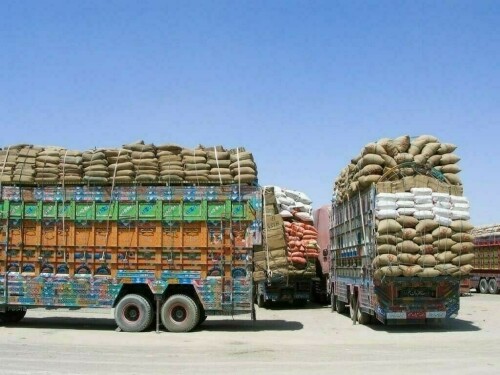Goods Transporters Halt Operations at Karachi Ports
Goods transporters have ceased their work at Karachi’s ports, protesting against the traffic police’s actions of impounding heavy vehicles deemed unfit for the roads.
Specifically, heavy transporters have stopped loading goods from Karachi’s ports in direct response to the crackdown targeting heavy vehicles failing to meet road safety standards. These transporters have chosen to park their vehicles at designated warehouses and truck terminals. According to their statements, activities have been completely suspended at key terminals including KICT (Karachi International Container Terminal), SAPT (South Asia Pakistan Terminal), and KGTL (Karachi Gateway Terminal). They also indicated plans to extend the suspension to operations at Port Qasim.
The cessation of operations has resulted in a substantial accumulation of import containers at major port terminals throughout Karachi.
On a typical day, around 7,000 heavy vehicles are involved in the movement of goods in and out of KICT, SAPT, and KGT, with an additional 3,000 vehicles servicing Port Qasim. The current operational halt has brought the transportation of both imported and exported goods to a standstill, leaving goods valued at millions of rupees stranded at the ports. Furthermore, export cargo from various warehouses is unable to reach the port for shipment.
Demands and Reactions
Amaan Pracha, the Vice President of the Federation of Pakistan Chambers of Commerce and Industry (FPCCI), has voiced strong opposition to what he describes as ‘forced’ fitness inspections of goods vehicles and has called for the immediate release of all impounded vehicles.
Pracha has appealed to the relevant authorities to consider and accept the demands put forth by the transporters to resolve the ongoing strike. He criticized the actions of the DIG Traffic regarding the cancellation of vehicle registrations as being without justification, advocating for the establishment of clear Standard Operating Procedures (SOPs) for the inspection and compliance process. He emphasized the necessity of granting transporters ample time to ensure compliance with fitness requirements for the large number of vehicles affected.
The Goods Transport Association, Karachi Goods Transport, Cargo Goods Transporters Association, along with other transport organizations, have collectively demanded the release of the confiscated vehicles and are requesting a grace period of six months to comply with the new regulations.
Tariq Gujar, President of the Goods Transporters Association, stated that vehicles will remain off the roads until successful negotiations with the government can be achieved, and assurances are provided to the transporters. He pointed out the considerable financial burden of installing necessary equipment like trackers and cameras, estimating costs between 200,000 to 300,000 PKR per vehicle. He affirmed the transporters’ commitment to adhering to the Sindh government’s mandates, pending the establishment of a mutually agreed-upon timeframe.
Imdad Naqvi, Chairman of the Goods Transporters Association, reported that approximately 300 vehicles have been seized by traffic police to date.
Nadeem Arain, General Secretary of Karachi Goods Transport, conveyed that transporters are primarily seeking sufficient time to meet the fitness regulations. He also addressed the issue of bribery involving traffic police, calling for an end to such practices. Arain reiterated the request for a six-month period to achieve full compliance with the fitness law.
Saifur Rehman Khan Wazir, Chairman of FPCCI’s Regional Standing Committee on Transport Affairs, highlighted the impracticality of conducting fitness certifications for over 25,000 vehicles in a short period, emphasizing that adequate time is essential to complete the process thoroughly.



Comments (0)
No comments yet. Be the first to comment!
Leave a Comment